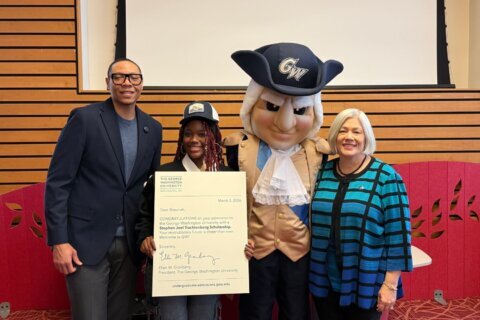In 2014, Eric Garner died after being put in a chokehold by New York City police during an arrest. Caught on tape, the incident sparked nationwide protests with demonstrators chanting his final pleas of “I can’t breathe.”
In a new book called “Finding My Voice: On Grieving My Father, Eric Garner, and Pushing for Justice,” Garner’s daughter Emerald speaks on life since losing her father when she was 22, and the strength she’s found talking to survivors of similar situations.
One such survivor was Martin Luther King III, who joined Garner for a discussion at the Northwest D.C. library that bears his father’s name on Sunday. The topic of the discussion was healing and activism in the aftermath of tragedy.
Both Garner and King spoke of being children who lost their fathers at a young age and seeing their personal loss become a public flashpoint. Garner said she didn’t even look at the video of her father’s death until years after.
“I didn’t watch the video of my father until I was in the room with his murderer,” she said. “During that trial, that’s the first time I watched it. I saw the autopsy photos, I listened to the testimony, I saw everything, pretty much. And I think that’s what saved my life.”
She added, “You’re not going to let that be the last image that I know of my father. The last image I have is us singing ’90s music and my mom cursing us out … That’s what I wanted to remember.”
King and Garner talked about navigating all that came after the death of their fathers and where they found the strength to not only survive, but to also speak out about the events.
King said allowing yourself to grieve, no matter how long it’s been since a traumatic event, is important. He recalled an interview where he spoke to a reporter about both his father’s assassination, as well as his grandmother’s, a few months ago.
“I just couldn’t control my emotions and started crying,” King recalled. “Again, it’s been 55 years, where did that come from? I don’t know. I do know it’s healthy, to grieve. And to get that out.”
King also said those who have experienced deep trauma are often able to experience deep empathy toward others.
“My father used to say that we often feel sympathy for a scenario. Sympathy is … you see someone on the street, and you give them coins, which is something that we need to do,” King said. “But empathy is not feeling for someone, it’s feeling with them … if we truly have empathy, then we will address the homeless issue in our nation, we will address injustice wherever and whenever it reveals its ugly head.”
Garner co-authored her book with former Washington Wizards player Etan Thomas who she said encouraged her to write a book. Thomas was also part of the panel discussion.
WTOP’S Mike Murillo contributed to this report.








